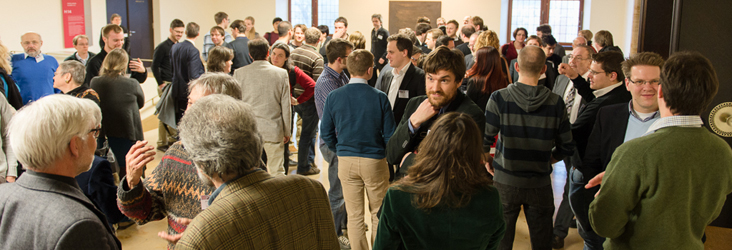
Events 2021
The Interdisciplinary Center for Scientific Computing (IWR) and its affiliated institutions organize a large number of workshops, conferences and other events for discussing latest scientific results as well as identifing upcoming challenges in the field of Scientific Computing. In addition the IWR regularly hosts events which emphasis on broadening and improving the interdisciplinary dialogue.
2021
[January][February] [March] [April][May][June][July] [August] [September] [October][November] [December]
December
IWR Colloquium Winter Semester 2021 / 2022
"Model Order Reduction Methods for Time-Harmonic Wave Problems"
Prof. Francesca Bonizzoni, Romberg Visiting Scholar • Augsburg University
December 1, 2021 • 16:15 • Virtual Talk
Many engineering applications require the numerical evaluation of time-harmonic wave propagation problems over a range of frequencies. The most used technique to discretize partial differential equations is the finite element method. Due to the oscillations of analytical solutions the finite element discretization often becomes computationally expensive.
Model order reduction methods provide reliable approximations of the solution at low computational cost. In particular, they allow very fast responses both for real-time and multi-query contexts.
This talk deals with novel model order reduction techniques tailored to time-harmonic wave problems relying only on a precomputed set of snapshots, they present great flexibility, since they allow the construction of a surrogate starting from snapshots obtained via black-box solvers (e.g., commercial software).
The method’s efficiency is investigated in several examples, including transmission-reflection and scattering problems. Especially in the context of optimal control problems, where standard numerical techniques are unfeasible, the employment of surrogate models is crucial.
IMPORTANT: in person meeting changed to ONLINE ONLY meeting
Unfortunately this meeting will only take place online due to the COVID-19 situation.
For more information please visit the website of the colloquium.
November
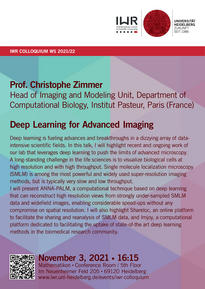
IWR Colloquium Winter Semester 2021 / 2022
"Deep Learning for Advanced Imaging"
Prof. Christophe Zimmer • Head of Imaging and Modeling Unit, Department of Computational Biology, Institut Pasteur, Paris (France)
November 3, 2021 • 16:15
Deep learning is fueling advances and breakthroughs in a dizzying array of data-intensive scientific fields. In this talk, I will highlight recent and ongoing work of our lab that leverages deep learning to push the limits of advanced microscopy.
A long-standing challenge in the life sciences is to visualize biological cells at high resolution and with high throughput. Single molecule localization microscopy (SMLM) is among the most powerful and widely used super-resolution imaging methods, but is typically very slow and low throughput. I will present ANNA-PALM, a computational technique based on deep learning that can reconstruct high resolution views from strongly under-sampled SMLM data and widefield images, enabling considerable speed-ups without any compromise on spatial resolution. I will also highlight Shareloc, an online platform to facilitate the sharing and reanalysis of SMLM data, and Imjoy, a computational platform dedicated to facilitating the uptake of state-of-the art deep learning methods in the biomedical research community.
The IWR Colloquium will be held as an in-person event at the Mathematikon. In addition it will be streamed via Zoom.
If your are planing to attend in person you have to follow the 3G-rule set (vaccinated, recovered, tested).
For more information please visit the website of the colloquium.
Location: Mathematikon • Conference Room, Room 5/104, 5th Floor • Im Neuenheimer Feld 205 • 69120 Heidelberg
October
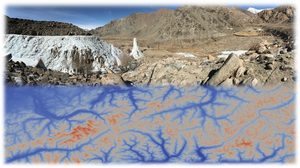
Indo-German Workshop on Water Availability and Quality Under Varying Environmental and Urban Conditions
Heidelberg University & Jawaharlal Nehru University, India
October 22 - 23, 2021 • Heidelberg University
Aim
Bring together researchers from geography, chemistry, biology, hydrology, social sciences, applied mathematics and scientific computing to foster interdisciplinary exchange on the various aspects of water availability and quality.
Format
Depending on the pandemic situation in the fall, the workshop will either take place as in person event or an online event. Depending on the demand a hybrid format is possible as well, so that participation is also possible without travelling.
Topics
- Socio-hydrology and water resources management
- Environmental contamination and remediation
- Sustainable technology for water purity
- Cryosphere dynamics
Organizers
- Peter Bastian, IWR, Universität Heidelberg
- Bernhard Höfle, Institute of Geography and HCE and IWR, Universität Heidelberg
- Martin Maier, Institute of Earth Sciences and HCE, Universität Heidelberg
- Dinesh Mohan, School of Environmental Sciences, Jawaharlal Nehru University
- Marcus Nüsser, South Asia Institute and HCE, Universität Heidelberg
- N. Janardhana Raju, School of Environmental Sciences, Jawaharlal Nehru University
- AL. Ramanathan, School of Environmental Sciences, Jawaharlal Nehru University
- Robert Scheichl, Institute for Applied Mathematics and IWR, Universität Heidelberg
For more information please visit the webpage of the workshop.
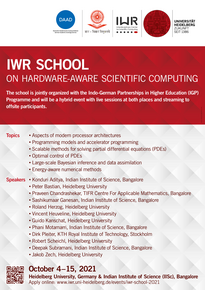
"Hardware-Aware Scientific Computing"
October 4-15, 2021 • Heidelberg University, Germany & Indian Institute of Science (IISc), Bangalore
The IWR School on Hardware-Aware Scientific Computing is jointly organized with the Indo-German Partnerships in Higher Education (IGP) Programme. It will be a hybrid event with live sessions at both places and streaming to offsite participants.
Aim
Bring together PhD candidates from Mathematics, Computer Science and Scientific Computing to study the interplay of efficient numerical algorithms with modern computer hardware.
Format
First week (October 4-8) is filled with lectures covering all aspects from hardware, programming models and algorithms to applications.
Second week (October 11-15) features small projects lead by a pair of supervisors from India and Germany.
Topics
- Aspects of modern processor architectures
- Programming models and accelerator programming
- Scalable methods for solving partial differential equations (PDEs)
- Optimal control of PDEs
- Large-scale Bayesian inference and data assimilation
- Energy-aware numerical methods
Speakers
- Konduri Aditya, Indian Institute of Science, Bangalore
- Peter Bastian, Heidelberg University
- Praveen Chandrashekar, TIFR Centre For Applicable Mathematics, Bangalore
- Sashikumaar Ganesan, Indian Institute of Science, Bangalore
- Roland Herzog, Heidelberg University
- Vincent Heuveline, Heidelberg University
- Guido Kanschat (IWR, UHD)
- Phani Motamarri, Indian Institute of Science, Bangalore
- Dirk Pleiter, KTH Royal Institute of Technology, Stockholm
- Robert Scheichl, Heidelberg University
- Deepak Subramani, Indian Institute of Science, Bangalore
- Jakob Zech, Heidelberg University
! Registration required ! (Deadline: August 20, 2021)
Locations: Heidelberg University, Germany & Indian Institute of Science (IISc), Bangalore
July
Live-Gespräch / 8. Mittelaltertag der Universität Heidelberg
"Die beschriftete Altarplatte in Reichenau-Niederzell"
Nikolas Jaspert (Historisches Seminar), Susanne Krömker (Interdisziplinäres Zentrum für wissenschaftliches Rechnen), Matthias Untermann (Institut für Europäische Kunstgeschichte), Kirsten Wallenwein (Lateinische Philologie des Mittelalters und der Neuzeit)
17. Juli 2021 • 14:00 • Online-Veranstaltung
Über 300 Menschen haben im 10./11. Jahrhundert beim Besuch der Klosterinsel Reichenau ihre Namen auf eine Steinplatte eingraviert oder mit Tusche geschrieben. Die Platte wurde 1976 entdeckt und diente damals als Altarplatte. Ein neuer hochpräziser 3D-Scan und die Auswertung der Ausgrabungen öffnen den Blick auf neue Fragen zu Entstehung und Funktion dieses einzigartigen Schriftdokuments frühmittelalterlicher Frömmigkeit.
Das Live-Gespräch finden am Samstag, 17. Juli 2021 im Rahmen des 8. Mittelaltertag der Universität Heidelberg statt. Um an den Live-Gesprächen teilzunehmen, klicken Sie bitte auf den nachfolgenden Link. Sie werden zu audimax.heinconf.uni-heidelberg.de weitergeleitet (Link öffnet in neuem Fenster). Geben Sie dort Ihren Namen ein und klicken Sie auf den Button »Teilnehmen«. Eine Einwahl in laufende Gespräche ist am 17. Juli 2021 jederzeit möglich.
Alle weiteren Informationen zum Live-Gespräch und dem 8. Mittelaltertag der Universität Heidelberg finden sich auf der Webseite der Veranstaltung.
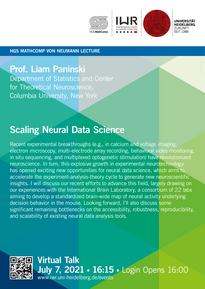
HGS MathComp Von Neumann Lecture
"Scaling Neural Data Science"
Prof. Liam Paninski • Department of Statistics and Center for Theoretical Neuroscience, Columbia University, New York
July 7, 2021 • 16:15 • Virtual Talk
Abstract: Recent experimental breakthroughs (e.g., in calcium and voltage imaging, electron microscopy, multi-electrode array recording, behavioral video monitoring, in situ sequencing, and multiplexed optogenetic stimulation) have revolutionized neuroscience. In turn, this explosive growth in experimental neurotechnology has opened exciting new opportunities for neural data science, which aims to accelerate the experiment-analysis-theory cycle to generate new neuroscientific insights. I will discuss our recent efforts to advance this field, largely drawing on our experiences with the International Brain Laboratory, a consortium of 22 labs aiming to develop a standardized brain-wide map of neural activity underlying decision behavior in the mouse. Looking forward, I'll also discuss some significant remaining bottlenecks on the accessibility, robustness, reproducibility, and scalability of existing neural data analysis tools.
The HGS MathComp Von Neumann Lecture is organized together with the Interdisciplinary Center for Scientific Computing (IWR).
This virtual talk will be held via ZOOM. Login opens 16:00.
June
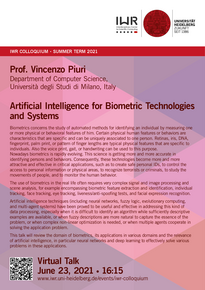
IWR Colloquium Summer Semester 2021
"Artificial Intelligence for Biometric Technologies and Systems"
Prof. Vincenzo Piuri • Department of Computer Science, Università degli Studi di Milano, Italy
June 23, 2021 • 16:15 • Virtual Talk
Biometrics concerns the study of automated methods for identifying an individual by measuring one or more physical or behavioral features of him. Certain physical human features or behaviors are characteristics that are specific and can be uniquely associated to one person. Retinas, iris, DNA, fingerprint, palm print, or pattern of finger lengths are typical physical features that are specific to individuals. Also the voice print, gait, or handwriting can be used to this purpose. Nowadays biometrics is rapidly evolving. This science is getting more and more accurate in identifying persons and behaviors. Consequently, these technologies become more and more attractive and effective in critical applications, such as to create safe personal IDs, to control the access to personal information or physical areas, to recognize terrorists or criminals, to study the movements of people, and to monitor the human behavior.
The use of biometrics in the real life often requires very complex signal and image processing and scene analysis, for example encompassing biometric feature extraction and identification, individual tracking, face tracking, eye tracking, liveness/anti-spoofing tests, and facial expression recognition.
Artificial intelligence techniques (including neural networks, fuzzy logic, evolutionary computing, and multi-agent systems) have been proved to be useful and effective in addressing this kind of data processing, especially when it is difficult to identify an algorithm while sufficiently descriptive examples are available, or when fuzzy descriptions are more natural to capture the essence of the problem, or when complex non-linear optimization is needed, or when multiple agents cooperate in solving the application problem.
This talk will review the domain of biometrics, its applications in various domains and the relevance of artificial intelligence, in particular neural networks and deep learning) to effectively solve various problems in these applications.
This virtual talk will be held via ZOOM. For more information please visit the webpage of the IWR Colloquium.
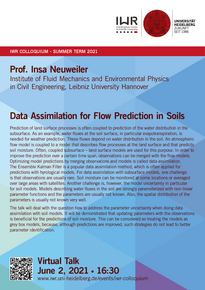
IWR Colloquium Summer Semester 2021
"Data Assimilation for Flow Prediction in Soils"
Prof. Insa Neuweiler • Institute of Fluid Mechanics and Environmental Physics in Civil Engineering, Leibniz University Hannover
June 2, 2021 • 16:30 • Virtual Talk
Prediction of land surface processes is often coupled to prediction of the water distribution in the subsurface. As an example, water fluxes at the soil surface, in particular evapotranspiration, is needed for weather prediction. These fluxes depend on water distribution in the soil. An atmospheric flow model is coupled to a model that describes flow processes at the land surface and that predicts soil moisture. Often, coupled subsurface – land surface models are used for this purpose. In order to improve the prediction over a certain time span, observations can be merged with the flow models. Optimizing model predictions by merging observations and models is called data assimilation. The Ensemble Kalman Filter is a popular data assimilation method, which is often applied for predictions with hyrological models. For data assimilation with subsurface models, one challenge is that observations are usually rare. Soil moisture can be monitored at some locations or averaged over large areas with satellites. Another challenge is, however, the model uncertainty in particular for soil models. Models describing water fluxes in the soil are strongly parameterized with non-linear parameter functions and the parameters are usually not known. Also, the spatial distribution of the parameters is usually not known very well.
The talk will deal with the question how to address the parameter uncertainty when doing data assimilation with soil models. It will be demonstrated that updating parameters with the observations is beneficial for the predictions of soil moisture. This can be considered as treating the models as grey box models, because, although predictions are improved, such strategies do not lead to better parameter identification.
This virtual talk will be held via ZOOM. For more information please visit the webpage of the IWR Colloquium.
May
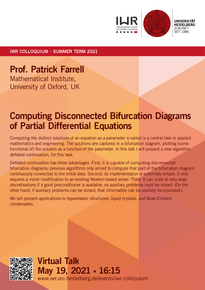
IWR Colloquium Summer Semester 2021
"Computing Disconnected Bifurcation Diagrams of Partial Differential Equations"
Prof. Patrick Farrell • Mathematical Institute, University of Oxford, UK
May 19, 2021 • 16:15 • Virtual Talk
Computing the distinct solutions of an equation as a parameter is varied is a central task in applied mathematics and engineering. The solutions are captured in a bifurcation diagram, plotting (some functional of) the solution as a function of the parameter. In this talk I will present a new algorithm, deflated continuation, for this task.
Deflated continuation has three advantages. First, it is capable of computing disconnected bifurcation diagrams; previous algorithms only aimed to compute that part of the bifurcation diagram continuously connected to the initial data. Second, its implementation is extremely simple: it only requires a minor modification to an existing Newton-based solver. Third, it can scale to very large discretisations if a good preconditioner is available; no auxiliary problems must be solved. (On the other hand, if auxiliary problems can be solved, that information can be usefully incorporated.)
We will present applications to hyperelastic structures, liquid crystals, and Bose-Einstein condensates.
This virtual talk will be held via ZOOM. For more information please visit the webpage of the IWR Colloquium.
April
IWR Colloquium Summer Semester 2021
"Machine Learning Representations of Molecular Electronic Structure: From Deep Learning of Wave Functions to Big-Data-driven Quantum Chemistry"
Prof. Reinhard J. Maurer • Department of Chemistry, University of Warwick (UK)
April 21, 2021 • 16:15 • Virtual Talk
Atomistic simulation based on quantum mechanics (QM) is currently being revolutionized by machine-learning (ML) methods. ML methods enable molecular property prediction within vast chemical compound spaces and the high-dimensional parametrization of energy landscapes for the efficient simulation of molecular dynamics. However, as all properties derived from the QM wave function, an ML model that is able to predict the wave function also has the potential to predict all other molecular properties. In this talk, I will explore ML approaches that directly represent QM properties beyond energies such as wave functions, QM Hamiltonians, and their derivatives for the development of methods that can use ML and QM in synergy. Using examples from molecular dynamics, and heterogeneous catalysis, I will discuss the challenges associated with encoding physical symmetries and equivariance properties into ML models of electronic structure. Upon overcoming these challenges, integrated ML-QM methods offer many interesting new opportunities. I will discuss several applications of ML-augmented quantum QC, including Inverse Chemical Design based on ML-predicted wave functions, the development of accurate semi-empirical methods, and the prediction of electronic spectroscopy.
This virtual talk will be held via ZOOM. For more information please visit the webpage of the IWR Colloquium.
February
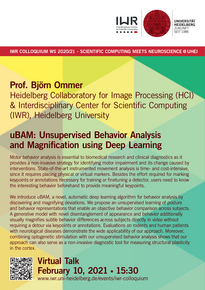
IWR Colloquium Winter Semester 2020/2021
"uBAM: Unsupervised Behavior Analysis and Magnification using Deep Learning"
Prof. Björn Ommer • Heidelberg Collaboratory for Image Processing (HCI) & Interdisciplinary Center for Scientific Computing (IWR), Heidelberg University
February 10, 2021 • 15:30 • Virtual Talk
Motor behavior analysis is essential to biomedical research and clinical diagnostics as it provides a non-invasive strategy for identifying motor impairment and its change caused by interventions. State-of-the-art instrumented movement analysis is time- and cost-intensive, since it requires placing physical or virtual markers. Besides the effort required for marking keypoints or annotations necessary for training or finetuning a detector, users need to know the interesting behavior beforehand to provide meaningful keypoints.
We introduce uBAM, a novel, automatic deep learning algorithm for behavior analysis by discovering and magnifying deviations. We propose an unsupervised learning of posture and behavior representations that enable an objective behavior comparison across subjects. A generative model with novel disentanglement of appearance and behavior additionally visually magnifies subtle behavior differences across subjects directly in video without requiring a detour via keypoints or annotations. Evaluations on rodents and human patients with neurological diseases demonstrate the wide applicability of our approach. Moreover, combining optogenetic stimulation with our unsupervised behavior analysis shows that our approach can also serve as a non-invasive diagnostic tool for measuring structural plasticity in the cortex.
This virtual talk will be held via ZOOM. For more information please visit the webpage of the IWR Colloquium.
IWR Colloquium Winter Semester 2020/2021
"Statistical approach for parameter identification of reaction-diffusion models"
Dr. Alexey Kazarnikov • Applied Analysis and Modelling in Biosciences, Institute for Applied Mathematics, Heidelberg University
February 3, 2021 • 16:30 • Virtual Talk
Mathematical models allow establishing a connection between observed data and a hypothetical underlying mechanism. However, a given biological process can robustly produce qualitatively and quantitatively similar patterns, which however always differ, depending on small variations in the initial state of the process. A statistical algorithm for parameter identification of reaction-diffusion systems is suggested that needs steady-state pattern data only, without knowledge of initial values or transient data. This is the situation often faced in experimental work. Model parameters that are able to fit given pattern data well enough are quantified by Bayesian sampling methods. In addition, this provides a tool allowing comparison of different mechanisms by checking how well a specific model can be fitted to the data produced by a model based on a different mechanism.
This virtual talk will be held via ZOOM. For more information please visit the webpage of the IWR Colloquium.
January
IWR Colloquium Winter Semester 2020/2021
January 20, 2021 • 16:30 • Virtual Talks
"Linking neural circuits to behavior: the need of quantitative approaches to assess naturalistic behaviors"
Dr. Claudio Acuna • Laboratory of Neural Circuits and Behavior, Institute of Anatomy and Cell Biology, Heidelberg University
Our lab is interested in understanding the molecular, synaptic and circuit basis of innate social behaviors and its dysregulation in devastating neuropsychiatric diseases such as autism and schizophrenia. In this talk, I will discuss our recent progress in understanding how long-range cerebellar outputs promote and regulate social interactions, and how dysfunction of these circuits might contribute to autism pathogenesis. I will also discuss the value of using quantitative approaches to study naturalistic social interactions, our current attempts to implement these approaches in the lab, and the need of establishing multidisciplinary teams to tackle these challenging questions.
"Single cell analysis of the genetic and epigenetic events regulating choroid plexus tumors"
Dr. Anthony Hill • Neuronal Signaling and Morphogeneis Laboratory, German Cancer Research Center (DKFZ)
Our goal is to understand the molecular and cellular mechanisms regulating choroid plexus tumor (CPT) progression. We are using single cell RNAseq and ATACseq of normal and tumorous human choroid plexus to analyze the genetic and epigenetic events leading to CPT initiation, growth and survival. From these raw data we can quantitate tumor associated changes in immune cell invasion and activation, cellular signaling and transcriptional regulation and trace the lineage of choroid plexus tumor cells. This work will involve computationally integrating multiple analyses to create a holistic view of choroid plexus tumor progression.
The virtual talks will be held via ZOOM. For more information please visit the webpage of the IWR Colloquium.